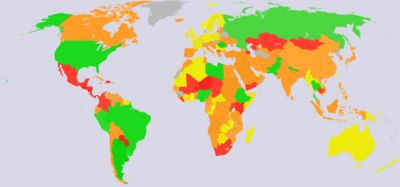Ask OLPC a Question about Countries/Summary
Why some countries and not others?
The reason is quite simple: the OLPC has made an offer (an inexpensive laptop) to national governments (not individuals or NGOs). Countries interested in the offer then decide if the offer is of their liking or not. If it is, negotiations and/or talks can start with the OLPC, and it's only then that they appear on the OLPC radar, and given a color/status depicting the level of commitment or interest.
How does the color/status scheme work?
| Click image to enlarge & text country list |
Basically countries in the map are coded in four colors (plus a generic one):
| green | those countries we plan to pilot Currently: Argentina, Brazil, Ethiopia, India, Libya, Nepal, Nigeria, Pakistan, Peru, Romania, Russia, Rwanda, Thailand, United States, Uruguay |
|---|---|
| red | those countries we plan to include in the post-launch phase |
| orange | those countries who have expressed interest at the Ministry-of-Education level or higher |
| yellow | those countries who are currently seeking government support |
| gray | countries under the radar or that have not made contact with the OLPC |
For a larger image and textual list you can click on the image on the right, or see the status by country page
What if I don't like my country's color?
If your country is color-coded in a hue with which you don't agree, you should lobby that country's government to start talks with the OLPC.
How can a country get involved?
By starting talks with the OLPC at national or ministerial level—minister or similar high-ranking government officials—not at individual level. Individuals should lobby their government to participate. More info.
